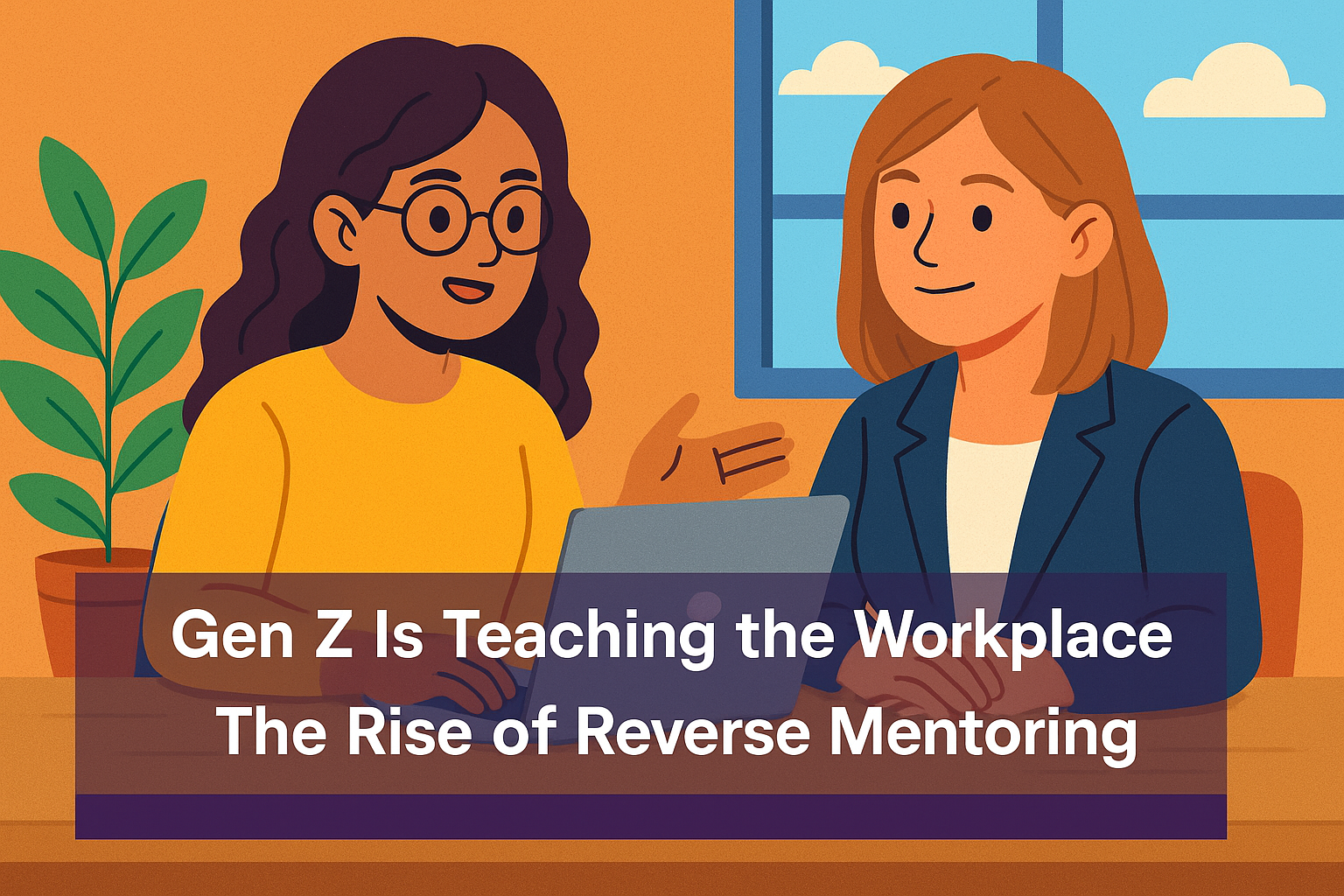The traditional flow of workplace wisdom — from seasoned executives down to younger hires — is shifting. Across industries, reverse mentoring programs are empowering Gen Z employees to guide senior leaders in areas like technology, digital culture, and inclusivity.
This new model isn’t just about helping older generations “keep up.” It’s a two-way exchange that’s redefining how organizations learn, innovate, and thrive in a fast-changing environment.
What Reverse Mentoring Looks Like Today
Reverse mentoring pairs younger employees with senior leaders to share expertise in emerging fields — from social media strategy to AI tools and new ways of working.
Unlike informal knowledge sharing, these programs are structured and intentional. Companies define goals, track outcomes, and ensure the relationships are built on mutual respect. The goal isn’t for Gen Z to “teach” in a classroom sense, but to co-create understanding across generations.
Gen Z mentors often bring:
- Digital fluency: Guiding executives through new platforms, collaboration tools, and online trends.
- Cultural awareness: Offering insights into inclusivity, sustainability, and authenticity — values that shape both workforce and consumer expectations.
- Market relevance: Helping senior leaders understand what matters to younger employees and customers alike.
Case Studies: Reverse Mentoring in Action
Unilever – Building Empathy Across Generations
Unilever was one of the early adopters of reverse mentoring, pairing junior staff with senior executives to discuss diversity, inclusion, and technology. The company reports that the program helped leadership teams better understand the experiences of younger, more diverse employees — driving both innovation and retention.
PwC – Teaching Tech and Trust
At PwC, reverse mentoring programs connect younger associates with senior partners to discuss emerging technologies and hybrid work tools. The result has been a faster adoption of digital workflows and a stronger sense of collaboration between generations.
General Electric – A Digital Transformation Catalyst
GE’s program began as a way to help executives adapt to the digital age. Younger employees coached senior leaders on social media, data visualization, and digital storytelling. What started as a tech initiative evolved into a broader culture shift toward openness and continuous learning.
Estée Lauder – Understanding New Consumers
To stay relevant in the beauty industry, Estée Lauder introduced a reverse mentoring program that linked senior leaders with younger employees to explore Gen Z consumer behavior. This initiative led to successful product launches and refreshed marketing campaigns aligned with emerging trends.
Cross-Generational Learning: Beyond Mentorship
Reverse mentoring is just one part of a bigger picture — cross-generational learning. Companies are intentionally mixing teams to balance the strategic experience of older workers with the digital dexterity of younger ones.
Hybrid teams that span generations are proving more innovative, agile, and empathetic. The message is clear: thriving organizations don’t just adjust for Gen Z — they learn from them.
Why It Matters
- Bridges generational divides: Fosters understanding and empathy across age groups.
- Accelerates digital transformation: Senior leaders gain hands-on insights into new technologies and trends.
- Strengthens retention: Gen Z employees feel seen, valued, and empowered to lead.
- Drives innovation: The blend of experience and new perspectives sparks fresh thinking.
Key Takeaways
- Reverse mentoring turns traditional hierarchy on its head — and that’s a good thing.
- Gen Z mentors help senior leaders master technology, embrace inclusion, and connect with younger audiences.
- Companies like Unilever, PwC, GE, and Estée Lauder show that structured, respectful programs lead to measurable cultural and business gains.
- Cross-generational collaboration isn’t a “perk” — it’s becoming a competitive advantage.
FAQ
Q: How does reverse mentoring benefit senior leaders?
It gives them access to real-time insights on technology, digital communication, and evolving workplace culture — all from those closest to the changes.
Q: Why is Gen Z particularly effective at mentoring older colleagues?
They’re digital natives with a strong sense of social responsibility and fresh awareness of consumer and workforce trends.
Q: How can companies start a program?
Begin by defining goals, selecting open-minded participants, and creating structured pairings with regular feedback sessions.
Sources
- Reverse Mentoring: Why Gen Z Is Career Coaching Boomers – Forbes (May 17 2025)
- Reverse Mentorship: What Leaders Can Learn from Gen Z – HR Interests (Mar 11 2025)
- Reverse Mentoring in the AI Era – Emerald Publishing (Aug 2025)
- The Reverse Mentoring Revolution – InterPromUSA (2025)
- When Reversing Can Take You Forward – HR Future (2025)
- Reverse Mentoring and Gen Z Engagement – PushFar (2025)

